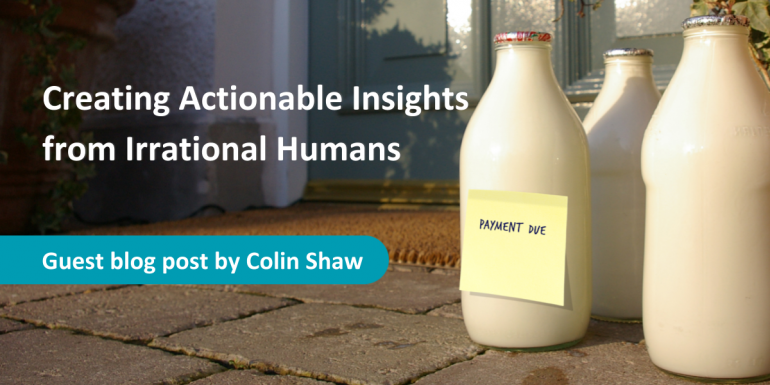Creating Actionable Insights from Irrational Humans

Whenever I talk about Customer Experience with audiences, I begin by explaining that customers do not buy things rationally. Customers buy things emotionally and then justify the purchase with logic.
Irrationality and data don’t mix. However, there are ways that people’s irrational behavior reveals a rational pattern in the data. Let’s take a look at actionable insights about people’s irrational behavior as customers and the importance of the human touch in a digital transformation.
Irrational Decisions Reveal Predictable Behavior
A lot of organizations assume customers make rational buying decisions. They also think survey responses are authentic. However, what people say and what people do are different. For example, a few years ago Disney asked people what they would change about the food at their parks. People said they wished for the option of a salad. So, Disney added salads, and people didn’t order them!
People didn’t lie; they thought they might want a salad. However, when it is time to order food, they think, “Hey! I am having fun. I deserve a treat,” and order junk.
Also, customers are often terrible at telling you why they did something. Again, it isn’t duplicity; it’s ignorance. Customers think they are telling the truth.
The reasons people do things are often hidden from the customers in their subconscious mind. The subconscious is always processing information for us and from time to time kicks up a decision to the conscious mind—with no explanation.
As a result, uncovering what customers want versus what they say they want is essential. We worked with a Texas hospital system years ago where surveys reported patients said they wanted more time with the doctor. However, we discovered what patients actually felt was that the doctor wasn't listening to them.
But what would have happened if the hospital did what the patients said they wanted and increased the time for appointments? The patient would still feel like the doctor wasn’t listening, but for longer, and the hospital’s costs would be higher. So, no one would be happy.
If you did what patients really wanted, get doctors to listen to them more, everyone is happy. Furthermore, by training medical staff on active listening skills, you might reduce the time spent per patient, decreasing costs and increasing patient satisfaction.
Actions speak louder than words. If you record data on customer behavior, their irrational decisions will lead to patterns in behavior that will reveal everything you need to know. You will see by what customers do what they really want, despite what they say they want.
Digital transformation and automation are excellent additions to Customer Experiences. However, with technology streamlining parts of the Customer Experience, do not throw out the excellent points an analog experience provides.
One of these excellent points is the power of human interaction. Let me explain.
We used to have a milkman deliver our milk. I suggested to my wife Lorraine we buy it at the store which was undoubtedly cheaper. Lorraine wasn’t keen. Kevin (the milkman) came on Fridays, she enjoyed chatting with him and felt loyal to him.
However, Kevin left, and Kevin’s replacement didn’t call or chat. Instead, he taped the bill to the milk bottle and asked us to leave a check under the mat.
The value of having milk delivered was the human touch when Kevin came around to chat. The automated experience led to us canceling the service and getting our milk from the store like everybody else. The replacement milkman automated the value right out of the experience.
Self-service and automated conversations have their place and can enhance Customer Experience. However, never underestimate the power of human touch and personal interaction. You don’t want to automate the value right out of your experience and send your customers running to the empathetic arms of your competitor.
About Colin Shaw
Colin Shaw is the founder and CEO of Beyond Philosophy, one of the world’s leading Customer Experience consultancy & training organizations. Colin is an international author of six bestselling books and an engaging keynote speaker. Follow Colin Shaw on Twitter @ColinShaw_CX.






